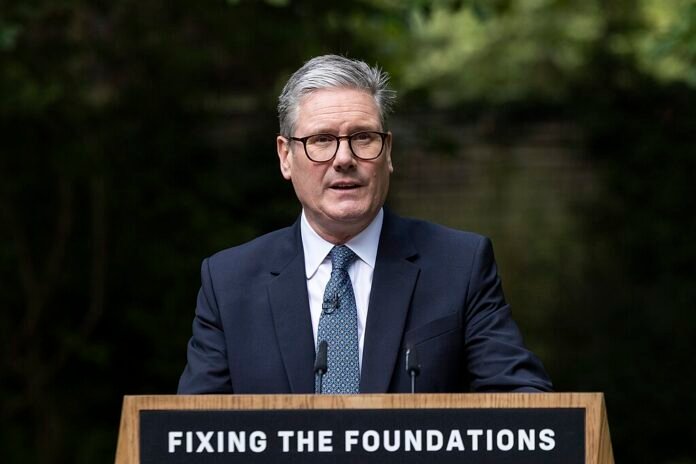Keir Starmer pledges to ‘hard wire growth’ into policy decisions as Labour aims for a robust economic future
In a bold move to reshape UK policymaking, Sir Keir Starmer has pledged to ensure economic growth is at the heart of every cabinet decision. Speaking during a round-table with business leaders in the City of London, the Labour leader announced that cabinet ministers would now be required to present the growth potential of any new policy before gaining approval from their colleagues.
Downing Street confirmed that all new policies would undergo the same rigorous scrutiny as public spending proposals, with their potential to foster growth now a critical factor in their assessment. The revamped approach to the Whitehall “write round” process is aimed at reinforcing the growth impact of all government initiatives.
“Everything has to be seen through the question of whether it is pro-growth,” Starmer told the executives. This statement underlines his commitment to pivot Labour’s focus towards economic recovery and expansion, marking a significant shift from previous, more cautious rhetoric.
The timing of Starmer’s speech coincided with a shift in tone from Chancellor Rachel Reeves, who was preparing to make a speech of her own, offering support for the long-debated third runway at Heathrow Airport. This proposal, which had previously met resistance from several senior cabinet members, is seen as a crucial part of Labour’s pro-growth agenda. In fact, Reeves’ speech is expected to signal a firm commitment to economic expansion, including initiatives that were once considered contentious within the party.
Embed from Getty ImagesBoth Starmer and Reeves used their meeting with business leaders to convey optimism about the UK’s economic future. This marks a clear departure from the gloomy rhetoric they had espoused last year. At the time, executives expressed concerns about the impact of Labour’s policies, including national insurance hikes and labour laws, on growth and investor confidence. Many pointed to Reeves’ earlier remarks about inheriting “the worst economic inheritance” as detrimental to the nation’s economic morale.
However, at Tuesday’s breakfast gathering, Reeves struck a markedly more positive tone. “It’s the role of government to shout about all the amazing things we are doing as a country,” she declared, signalling that Labour would actively showcase the UK’s strengths. “We want to partner with you in business to showcase all the great things we have going for us,” she added.
Reeves’ upcoming speech is expected to further detail Labour’s economic agenda, which includes speeding up growth and approving major infrastructure projects like the expansion of Heathrow. This, however, has sparked tensions within the party, particularly among left-wing MPs concerned about the environmental impact and consumer interests. Notably, seven members of the current cabinet, including Starmer, had opposed Heathrow’s expansion in 2018. While some remain uneasy, like Ed Miliband, who had been a strong critic of the project, they have indicated that they will not resign over the issue.
In addition to Heathrow, Reeves will highlight her plans to simplify the planning system and relax some rules concerning the £160bn surplus in defined benefit pension schemes. These moves are part of her broader promise to fast-track economic growth, despite unease among certain party factions.
Corporate leaders attending the City of London roundtable, including Charlie Nunn of Lloyds Banking Group and Jennie Daly of Taylor Wimpey, voiced their support for Labour’s focus on growth but cautioned against further tax increases. “The last thing we want is to see business rates deter investment into the industry,” said Paul Golding, CEO of Pinewood Studios.
Last week’s PwC survey of chief executives revealed that the UK remains a strong investment destination, ranking second only to the US. With these new policy proposals, Starmer and Reeves are clearly hoping to reinforce that message and position Labour as the party of pro-growth, forward-thinking policies.
THE TELEGRAPH
Prime Minister Sir Keir Starmer is set to overhaul Labour’s stance on economic policy, signalling a shift away from anti-growth measures in an attempt to prevent a looming recession. Amid mounting pressure over the UK’s stagnant economy, Starmer has pledged to veto policies that hinder growth, focusing instead on creating conditions that foster business investment and job creation. However, this pivot is likely to cause tension within the party, particularly around issues like workers’ rights and the commitment to net-zero targets. Starmer’s new economic priorities aim to address criticisms of Labour’s handling of the economy, with hopes of reassuring businesses and voters that the party is serious about economic revitalisation.
CITY AM
Prime Minister Sir Keir Starmer has expressed confidence that the UK economy is on the mend, describing it as “turning around” as the Labour government aims to address stagnation. In a Bloomberg TV interview, he emphasised that growth is the government’s top priority, stating, “Growth, growth, growth.” Starmer’s comments come as the government faces criticism over its handling of the economy, including a £40bn tax rise and a £25bn national insurance increase. Despite economic surveys showing low business confidence, Starmer remains optimistic. He revealed plans to embed growth into all government policies, making it a key factor in decision-making. However, opposition figures, such as Shadow Business Secretary Andrew Griffith, argue that growth strategies should focus on immediate concerns like business retention and regulatory burdens, warning that excessive red tape could harm the economy. Starmer’s remarks come ahead of a crucial speech by Chancellor Rachel Reeves on growth strategies.
